The little guy, whether he lived in a tenement in the city or in a ramshackle house on the plains, was getting trampled by the money trust and the captains of industry. Disgust with both major parties was growing as pandering pols refused to take a decisive stand on the major issues of the day, and the White House seemed incapable and/or unwilling to change things. Money and cynicism were inseparable from the political process, and tabloid journalism ruled the media, fanning the flames of America’s basest passions and prodding the nation toward an imperialist horizon.
No, this isn’t another story from the Cave’s BREAKING!!! desk – but it could have been, a little over 100 years ago. Join me, if you will, for a look at how turn-of-the-century Progressives dealt with issues not all that dissimilar from the ones currently being bungled and shied away from in Washington…
Historiorant: Please consider this a sequel to Plain Progressives, which was posted a couple of weeks ago. Last week, of course, your resident historiorantologist had to clear the decks for a piece on Delaware, Caesar Rodney, and possum, so as to coincide with the campaign-announcement-week festivities surrounding Jerry Northington‘s entry into the DE-01 Congressional race, but that’s turned out to have resulted in another bit of blogospheric/real-world synchronicity: now the article on Coxey’s Army happily coincides with the Washington protests. Regrettably, I could be there only in spirit, but my names (both Moonbatty and real-world) were carried on signs wielded by Kossacks jlynne – who was the driving organizational force behind Road2DC.com – and Got a Grip. Thanks, ladies – this one’s for you!
More Progressive Prophets of the Plains
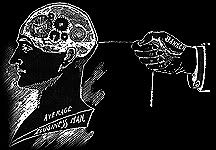 When the tumultuous story of the rise of the Populist movement cliffhanged a couple of weeks ago, I was babbling about Atlantis-finding Ignatius Donnelly – one of dozens of left-wing messengers and would-be prophets who sought to explain and define progressive positions in the late 19th century. Unfortunately for them, these issues were regionally and vocationally diverse; outside of a few overarching social issues, there was little basis for unity among the different species of progressives, who might hail from union factory towns in the east, sharecropper plots in the south, or foreclosure-threatened farms on the plains. Still, they made one hell of a charge against the gates of power, and those terrible walls shuddered to their very foundations – changing government policy and societal outlook for the better – for a couple of decades before the foe once again found its footing through the mechanism of war.
When the tumultuous story of the rise of the Populist movement cliffhanged a couple of weeks ago, I was babbling about Atlantis-finding Ignatius Donnelly – one of dozens of left-wing messengers and would-be prophets who sought to explain and define progressive positions in the late 19th century. Unfortunately for them, these issues were regionally and vocationally diverse; outside of a few overarching social issues, there was little basis for unity among the different species of progressives, who might hail from union factory towns in the east, sharecropper plots in the south, or foreclosure-threatened farms on the plains. Still, they made one hell of a charge against the gates of power, and those terrible walls shuddered to their very foundations – changing government policy and societal outlook for the better – for a couple of decades before the foe once again found its footing through the mechanism of war.
Ah, to hear those great orators! – proclaiming progressive goals with an eloquence so far removed from present political discourse that many in our government and pundit classes could scarce understand, much less match wits with, even the least of the angry soapbox speakers. To wit: Once my time machine is completed and I can freely roam the temporal seas, I’m going to make sure to sit in on an event that features a Populist “calamity howler” named Mary Elizabeth Lease. A good one might be her pro-silver address at the Cooper Union Hall in New York on August 10, 1896:
“An organized effort is making to deceive the people. There are two great enemies of thought and progress, the aristocracy of royalty and the aristocracy of gold. Long ago, the aristocracy of royalty came to a common plane with the common people by the discovery of gunpowder, and the two met on a common field. Where is the respect of old for royalty? Even the English speak of their sovereign, Queen Victoria as being made not of common clay, but of common mud. The aristocracy of royalty is dying out.
“But here in this country we find in place of an aristocracy of royalty an aristocracy of wealth. Far more dangerous to the race is it than the aristocracy of royalty. It is the aristocracy of gold that disintegrates society, destroys individuals and has ruined the proudest nations. It has called Rothschild’s agent here to make the platform of the Republican party.”
Of course, that’s the part the comes in the form of a objective quote, not a biased interpretation. For that, you’d need to visit the article in the August 11 edition of the New York World:
CHEERED MARY E. LEASE.
The Crowd Liked Her Dununciation of Cleveland and Whitney
SOCIALISM RAMPANT AND NOISY.
Every Reference to Wealth and Its Owners Received with Wild Delight.
ATTACKED THE ENTIRE SOCIAL SYSTEM.Likened John Sherman to a Footpad and Evoked the Most Enthusiastic Applause.
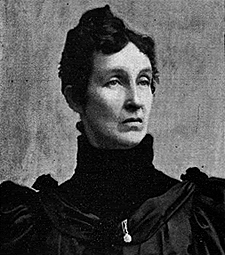
Mary Lease (nee Clyons) was an Irish Catholic from western Pennsylvania whose life story reads like an epic screenplay of the “Angela’s Ashes” variety. Her parents emigrated from County Monaghan during the Potato Famine that emptied Ireland of a quarter of her population in the mid-1800s, then she lost a brother and her father during the Civil War. Mary developed a lifelong hatred for Democrats when she learned of the conditions under which her dad – a prisoner at Andersonville – perished, but she found little solace in the policies of the Republicans (by the time of Lease’s greatest prominence in the 1890s, the elephants had drifted from the sanctimonious righteousness of Reconstruction to wallowing in money-soaked debauchery not alike that we see today). In 1870, she took a job in a mission school in Kansas, where she met and married her husband, a druggist named Charles.
Alas, the salad days were short-lived: Charles (along with a whole lot of other folks) lost his ass in the Panic of 1873, when a bank owned by one of the Union war effort’s (and Union Pacific Railroad’s) principal financiers collapsed. Predictably, this precipitated a run on local banks, massive sell-offs on Wall Street, and a decline in farm prices coupled with an increase in foreclosures – and since these things tend to fall hardest on those least able to weather them, the Leases found themselves starting over again in Texas, where two of her six children died in infancy (one of the surviving kids was named Ben Hur, after the Christian hero in Civil War general/pop author Lew Wallace’s novel).
A “petticoated smut-mill”
The 1880s saw Mary Lease becoming involved in political issues, as well as her return to Kansas and an increasing notoriety amongst unionists, free silverites, and, eventually, socialists. Her path toward radical rabble-rousing began innocently (and typically, for the time) enough: she joined the Women’s Christian Temperance Union in support of Prohibition, then became active in the women suffrage movement. After moving to Wichita, she got involved with labor politics, the Farmer’s Alliance, and finally, the Populist Party, where she really hit her stride as anti-Democrat, anti-Republican, pro-progressive stump speaker.
Weird Historical Sidenote: The entrenched powers on both sides of the aisle detested Mary Elizabeth Lease, so much so that her detractors began asserting that her middle name was actually “Ellen” – which, when paired with the word “yellin’,” had an alliterative quality – “Yellin’ Mary Ellen,” or just “Mary Yellin'” – that “Elizabeth” or its diminutives simply couldn’t provide. And as long as we’re setting the record straight on things, she may not have been the first person to tell Kansans to “raise less corn and more hell” – the honor of that coining falls to labor leader Ralph Beaumont – but Mary Yellin’ didn’t correct folks when they attributed it to her.
Mary Lease traveled around the country speaking on behalf of progressive causes throughout the 1890s, staking out positions in opposition to “fusion” with the Democratic Party (though she supported William Jennings Bryan in the critical 1896 election), while simultaneously pissing off Republican wingnuts. By the middle of the decade, her outspoken and fiery demeanor was causing the mainstream media to react in ways that shows clearly how little they’ve evolved since the days of Pulitzer and Hearst:
Mrs. Lease is representative of the party–we will not call it Democratic–which presents Mr. Bryan as a candidate…. In the principles she avows, and the policies she advocates, in the coarse vigor of her speech and the startling aggressiveness of her manner, she is in the highest degree the best and truest exponent of the Bryan platform and party. In the extravagance of her language, the wantonness and recklessness with which she appealed to class hatred, pointing out by name as the proper objects of popular vengeance good and honorable citizens whose only offence is the possession of property accumulated honestly under the laws, she may have seemed to be in advance of her party. But only a step; just enough to bring out with clearness and distinctness the real spirit and purpose of the revolutionists and Anarchists who are bent on the destruction of public credit and the overthrow of social order. A step behind this raging virago, foaming with fury and blazing with wrath, is the wild mob of levellers eager for the general distribution of spoils; behind them the Terror, with its bloody bacchanals and merciless savagery. –
New York Tribune, August 13, 1896, via Vasser.edu
Aww…those poor little “good and honorable citizens” with their honestly accumulated property, under assault from Anarchists favoring a general distribution of spoils – and a Reign of Terror, to boot! I feel as bad for them as I do for Paris Hilton, knowing that her inheritance is going to have to pass through a government estate-tax wringer before being returned to her nearly intact – though on the other hand, Ms. Hilton did do more jail time for her crimes than Scooter Libby ever will for his.
We’re not in Bleeding Kansas anymore
…Or are we? The election of 1890 was a watershed year for both Mary Lease and for the Populists, as farmers tired of getting screwed by railroad companies showed up in unexpectedly high numbers (107,000 in Kansas alone, according to Populist Kansas: A Human Capital Interpretation) and propelled to Washington a total of 8 Congressmen and 2 Senators. They also became a driving force in Kansas politics for the next decade, at times controlling both houses of the legislature and the governor’s mansion before assembling the typical liberal circular firing squad and engaging in self-defeating compromises with a minority foe.
Left: 80.1-100% Republican 80.1-100% Democratic 60.1-80% Republican 60.1-80% Democratic <=60% Republican <=60% Democratic 60.1-80% Populist House seats by party holding plurality in state
Right: 6+ Republican gain 6+ Democratic gain 3-5 Republican gain 3-5 Democratic gain 1-2 Republican gain 1-2 Democratic gain 3-5 Populist gain 1-2 Populist gain no net change (source: Wikipedia)
The most extreme of these flaps came after the State House elections in January and February, 1893, after the Populists won the governorship and 58 seats in the House in the 1892 elections. The Republicans won 65 seats (Dems had the other 2), but the Populists claimed that due to Republican election fraud (some things really don’t change) they’d been cheated out of an additional 18 seats, and went ahead with electing their own Speaker based on that premise. At the same time, the Republicans formed their own private legislature, and by Valentine’s Day, the sergeants-at-arms of the Republican House was attempting to arrest members of the Populist one, the members of which had barricaded themselves inside the state capitol.
In a move that must be one of the first chapters in Karl Rove’s secret book on how to steal elections, the Republicans ignored the fact that both the Senate and the governor had recognized the Populist House as the legitimate governing body. They gathered up weaponry and sledge hammers, threw aside the guards set up outside the capitol, and literally battered in the doors. Once inside, they ensconced themselves as the new (though fraudulently elected) Congress by driving the Populists into the basement and daring the governor (and an increasing number of armed farmers streaming into the capital) to do something about it. He tried, but a Colonel Hughes of the state militia (a Hughes-friendly website here) defied orders to remove the Republicans “at the point of a bayonet” based on his own interpretation of the separation of powers.
The situation created a standoff which saw the insubordinate commander relieved of duty (and eventually courts-martialed, stripped of rank, and dishonorably discharged – but don’t worry; the next governor re-promoted him to brigadier general and he went on to serve as Adjutant General of Kansas from 1905-1909). Still, the delay he caused was enough to get the whole matter tossed to the courts – then, as now, an almost wholly-owned subsidiary of the Republican Party. The justices found against the overreaching governor, and the Republicans were permitted to keep their ill-gotten, obstructionist House, which they used to derail Populist legislation for the next two years.
Later, after unassailable majorities had been secured in subsequent elections, the Populists fell into that ever-popular left-wing trap of being willing to compromise on core beliefs in the name of being equitable toward those who, were the positions reversed, would run roughshod over their socially responsible programs without a second thought. So it was that even with a Bush-like hold over two of the three branches of state government in 1897, the Populists were unable to agree on a formula for rail freight rates (the issue that had brought many farmers to the party in the first place), and saw a compromise measure vetoed by a Populist governor on the basis that it wasn’t Populist enough; eleventh-hour attempts to rein in the evils of the rail barons after the losing elections of 1898 were later found (predictably) to be unconstitutional. (a far more exhaustive look at the railroad/human being battles can be found at Kansas Conflict: Populist Versus Railroader in the 1890’s – u.m.)
High Water in Omaha
They’d come out of nowhere in 1890 to win a disconcerting number of seats in Washington, and two years later, the Populists had a fuller head of steam than any of the railroads they were fighting. At their convention in Omaha in early July, they adopted one of the ballsiest platforms ever advanced by a party that contended seriously for the White House – looking at it now, I have a pretty good idea who would’ve gotten my vote on November 8th:
PLATFORM
We declare, therefore-
First.-That the union of the labor forces of the United States this day consummated shall be permanent and perpetual; may its spirit enter into all hearts for the salvation of the Republic and the uplifting of mankind.
Second.-Wealth belongs to him who creates it, and every dollar taken from industry without an equivalent is robbery. “If any will not work, neither shall he eat.” The interests of rural and civic labor are the same; their enemies are identical.
Third.-We believe that the time has come when the railroad corporations will either own the people or the people must own the railroads, and should the government enter upon the work of owning and managing all railroads, we should favor an amendment to the Constitution by which all persons engaged in the government service shall be placed under a civil-service regulation of the most rigid character, so as to prevent the increase of the power of the national administration by the use of such additional government employes.
FINANCE.-We demand a national currency, safe, sound, and flexible, issued by the general government only, a full legal tender for all debts, public and private, and that without the use of banking corporations, a just, equitable, and efficient means of distribution direct to the people, at a tax not to exceed 2 per cent. per annum, to be provided as set forth in the sub-treasury plan of the Farmers’ Alliance, or a better system; also by payments in discharge of its obligations for public improvements.
1. We demand free and unlimited coinage of silver and gold at the present legal ratio of l6 to 1.
2. We demand that the amount of circulating medium be speedily increased to not less than $50 per capita.
3. We demand a graduated income tax.
4. We believe that the money of the country should be kept as much as possible in the hands of the people, and hence we demand that all State and national revenues shall be limited to the necessary expenses of the government, economically and honestly administered.
5. We demand that postal savings banks be established by the government for the safe deposit of the earnings of the people and to facilitate exchange.
TRANSPORTATION-Transportation being a means of exchange and a public necessity, the government should own and operate the railroads in the interest of the people. The telegraph, telephone, like the post-office system, being a necessity for the transmission of news, should be owned and operated by the government in the interest of the people.
LAND.-The land, including all the natural sources of wealth, is the heritage of the people, and should not be monopolized for speculative purposes, and alien ownership of land should be prohibited. All land now held by railroads and other corporations in excess of their actual needs, and all lands now owned by aliens should be reclaimed by the government and held for actual settlers only.
The Omaha Platform, July 4, 1892 (note that that last bit regards the kind of aliens Republicans actually like – the ones who rake in wealth as absentee landlords and tenant farm amassers)
The Populists nominated James B. Weaver as their Presidential candidate; he went up against Republican incumbent Benjamin Harrison, ex-President and three-time-in-a-row Dem nominee Grover Cleveland, and a pair of no-chance-in-hell darkhorses from the Prohibition and Socialist Labor parties.
The Man, 1…Oppressed Steel Workers, 0
1892 was a tough summer, in a lot of ways: Occurring at the same time as the Populist convention was an involuntary wage reduction and lockout (complete with a three-mile wooden wall topped with barbed wire and pierced by what in the Middle Ages would have been called arrow slits) perpetrated by classic industrial age villain Henry Frick, a toady of the eminently-culpable Andrew Carnegie, at the Homestead steel plant in Pennsylvania. There, ham-handed attempts to break a union which had initially been supported by Carnegie resulted in an overwhelming majority of even non-union workers to vote strike, even as the great library-builder retreated to a remote castle in Scotland and made himself available only to Frick.
The strikers ran off the deputized townsmen who were guarding the plant for Frick, and occupied and fortified it against the inevitable counterattack. This came on the night of July 5, when tugboats pulling barges full of Pinkerton Detective Agency goons made their way up the Monongahela and made to offload the Winchester-toting private army on the banks below the plant. Owing to good intel – and a Revere-like ride through town at 3 AM – the workers were prepared to contest the amphibious assault, and upon their arrival, the Pinkertons were told not to step off the barges. They did so anyway, and in the ensuing commotion, the first (though it never was clear who fired it) of what turned out to be many, many shots was fired.
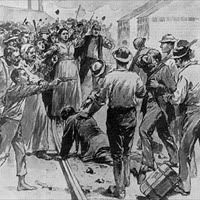
Over the next 14 hours, the strikers, who held the high ground in more ways than one, rained gunfire and all kinds of other stuff down on the Pinkertons – at one point, they even lit a railroad car on fire and sent it tumbling down the hill toward the barges, then followed up by tossing dynamite at their hulls in an effort to sink them. Later an attempt to burn the barges fizzled when the oil the workers had pumped onto the river upstream failed to ignite, but at the end of the day, the Pinkertons were obliged to surrender nonetheless.
They’d given as good as they’d got: 3 “detectives” had been killed, and 9 workers, but the defeat of the Pinkertons allowed for the governor of Pennsylvania to up the violence ante in favor of Frick and Carnegie. He ordered in the state militia; the workers’ fortifications were, of course, no match for either real soldiers or for Gatling guns. With the plant back in the hands of those who didn’t labor there, Frick began importing scabs and strikebreakers, often in locked rail cars so as to be unaware of their destination until they arrived to screw their brethren.
The strikers held out for four months before the threat of starvation compelled them to return to work, and in the spirit of kicking one’s defeated enemy into a shapeless mass of goo, murder charges were brought against strike leaders, lesser counts against 160 others, and the entire Strike Committee was arrested for treason. The Alberto Gonzaleses of the time apparently had a difficult time finding a jury sympathetic to their case: none of the strikers charged with crimes during the Homestead Strike were convicted. Their solace presumably came from the fact that union power in steel mills was broken, and that the blacklisting of strike organizers was something that would continue to exert vengeance for years to come.
Historiorant: And Carnegie? Oh, he’d cry you a river as big as the Johnstown Flood of 1889 (for which he was also tangentially responsible), if you’d hear him out. It just tore him apart, don’tcha see?, that he’d been forced into busting a union he’d helped to empower – ’cause, well, sorry, but it’s just business:
This is the trial of my life (death’s hand excepted). Such a foolish step — contrary to my ideals, repugnant to every feeling of my nature. Our firm offered all it could offer, even generous terms. Our other men had gratefully accepted them. They went as far as I could have wished, but the false step was made in trying to run the Homestead Works with new men. It is a test to which workingmen should not be subjected. It is expecting too much of poor men to stand by and see their work taken by others. . . The pain I suffer increases daily. The Works are not worth one drop of human blood. I wish they had sunk.
But they didn’t sink, and Carnegie continued to let them smelt out a fortune with which he could buy historical forgiveness by constructing libraries and music halls – and at least his hands were clean of the blood spilled by federal troops in breaking a strike among silver miners near Coeur d’Alene at the same time as the Homestead violence.
Next, place the muzzle against the top of either foot…
With passions thus inflamed, the Populists seems poised to make enormous gains in the November elections – all that remained was to get the disparate elements of the outraged left on board their platform, which naturally proved far more difficult than any of the single groups of players could have imagined. Exploited urban industrial workers, apparently unaware that a rising tide lifts all boats, didn’t exactly rally to the cause of Midwestern farmers, and there were even divisions among the farmers themselves. These were nothing so nuanced as a disagreement over the regulation of railroads, but instead can be traced to the racism so prevalent during the era – conservative “Bourbon elites” (nearly all Democrats) in the South used cynicism and historic antagonisms to persuade poor whites to vote against their own self-interest and leave the black sharecroppers with whom they shared so many miseries high and dry at the ballot box.
The Populists sent in their big guns in their ultimately failed effort to woo the crucial Southern farm vote. Among these was Georgian Thomas E. Watson, who for a while saw past the racial divide and used his oratorical skills – it was said he could “talk like the thrust of a Bowie knife” – to stump for solidarity among the poor, irrespective of skin color. I say “a while,” because Watson later reinvented himself as a class-A racist bigot; by 1908, he was advocating the disenfranchisement of blacks.
Watson’s later works were written in the context of a South that strongly desired never again to be threatened by the potential exercise of black political strength. So it was that while Watson wound up with a statue at the steps of the Georgia capitol, those sharecroppers and poor urban blacks who had had the insolence to believe in the system were made to pay dearly for their agitation – the post-1892 era saw an aggressive increase in the use of literacy tests and poll taxes to disenfranchise blacks, along with more severe Jim Crow laws and, a few years later, the handing down of the Plessey v. Ferguson decision.
Even more odious was the implementation of a “grandfather clause” in several states, which stated that no one who had not been eligible to vote (or who ancestors hadn’t been eligible to vote) prior to 1866 – back before the Reconstruction-era amendments abolished slavery – would be allowed to vote now. Though declared unconstitutional in 1915, the damage caused by the grandfather clauses was long-lasting: an entire generation had been cut out of the political process, while their oppressors reworked the laws that would keep them disenfranchised even after the most egregious laws were judicially undone.
The Agony of Defeat
James Weaver did better than virtually any third-party candidate in American history, but that’s not to say he won. When the ballots were counted and the electoral map colored in, the results looked like this:
I’m proud to note that your humble Moonbat’s current state of residence is among those that sent its electors to Washington with a true message for change, but the Populists just weren’t able to gather enough momentum in the East and South to seriously threaten capturing the White House. In the end, the presence of the Populists probably drew more support away from the Republican Harrison than the Democrat Cleveland, and Grover took over for a second, famously non-consecutive time.
He’d barely lowered his hand after the inauguration when yet another of those 1800s Panics ensued – and it turned out that the Panic of ’93 was the worst one of all. Within 6 months, 8000 businesses had shut down, dozens of railroads went into receivership, and hobos and soup lines that presaged those of the 1930s were commonplace. Also presaging the beginnings of the Great Depression was the federal government’s unshakeable adherence to the doctrine of laissez-faire economics – a firm belief that it was absolutely powerless in the face of the almighty Free Market.
Though the reasons for it were legion, the main cause of the Panic of 1893 was a well-meaning piece of legislation passed back in 1890. The Sherman Silver Purchase Act of 1890 had been part of a broader compromise between Republicans who wanted a high protective tariff and Populist-pressured Democrats who favored the use of silver-backed currency. Under the deal, the government issued notes that were redeemable in either gold or silver, which essentially turned the Treasury into a machine that dispensed gold in exchange for silver (part two of this lunacy was that the government was obligated to buy up virtually all the silver being produced, which drove its price down, thus exacerbating the problem).
President Cleveland pushed for a repeal of the Sherman (btw, this is the same Sherman as the Antitrust Act of 1890 guy) Silver Purchase Act, but he was voiciferously opposed by some more of those Populist inspired/pressured Democrats. Among these was 33 year-old Nebraska Congressman William Jennings Bryan, who promised that “hell would freeze over” before Cleveland rescinded the law, but the old pol was just too cagey for the naïve young silverite: Cleveland used his nepotistic powers to break a Senate filibuster, thereby ensuring a nice, healthy split in the Democratic Party for the remainder of his term.
An Army of Pissed-Off Progressives
No, I’m not talking about Road2DC.com and yesterday’s mass protest against the continued occupation of Iraq, but I am talking about their ideals-driven ancestors-in-spirit. In 1894, Jacob Coxey, a wealthy quarry owner from Ohio, organized a march he called the “Commonweal of Christ” or “Industrial Army,” with a rather pie-in-the-sky vision of gathering more than 100,000 unemployed and angry men under his banner as he closed in on the capital. Alas, the marcher’s song
We’re coming, Grover Cleveland,
500,000 strong,
We’re marching on to Washington,
To right the nation’s wrongs.
turned out to be as fantasy-ridden as Coxey himself – I mean, the guy named his kid “Legal Tender” to show his undying support for the workingman’s cause, and rode in a carriage at the head of his army along with his wife and family. His protest fizzled like a Gathering of Eagles when, as vasser.edu reports,
Coxey’s Army picked up many allies and sympathizers on its march to Washington, but it also stirred panic among those who feared an insurrection of the unemployed. When the (+/- 500) members of the Army reached Washington they were driven from the Capitol lawn. Coxey, who tried to read a prepared statement on the Capitol steps, was jailed for trespassing, though allies later read his speech into the Congressional Record.
(note: the standard Powers That Be dismissal of Coxey usually ends with some mention of the trespassing charge amounting to his failing to keep off the grass. – u.m.)
However his march may have turned out, Coxey advocated some serious reforms – they would have included selling government bonds to finance public works spending, as well as the issuance of $500 million in inflationary notes, to counter the depression. Though he continued to be a leading voice of the Populists through the end of the century (“Coxeyite” was often used interchangeably with “Populist” by those not in the know), Jacob Coxey never again achieved the national prominence he did with his militant act of civil disobedience. He did turn out to be a remarkably prescient predictor of the future, however – in 1896, he wrote in The Coming Nation (a reform paper based in Tennessee),
That concentration of wealth will rather be accelerated than otherwise by the change. That the election of a Republican or a Democrat as president of this “republic” will have no more effect on invention than the use of more machinery, than the kick of a gnat on the Rocky Mountain. We admit that this is rather a gloomy forecast; but experience warrants it and events will justify it.
Government by Injunction
A few days after Coxey’s Army disbanded at the foot of the U.S. Capitol, another group of downtrodden workers demanded respect from yet another oppressive industrial master, this time outside Chicago. There, laborers at the Pullman Palace Car Company had long been subjected to the feudal conditions of life in a company town, where, as one of the workers put it,
We are born in a Pullman house, fed from the Pullman shop, taught in the Pullman school, catechized in the Pullman church, and when we die we shall be buried in the Pullman cemetery and go to the Pullman Hell.
Actually, the company-built church usually stood empty, since no company-approved congregation was willing to rent the facility from the bosses. Their souls didn’t much matter much to their paternalistic overlords, but where they lived and shopped did: they were obligated to rent housing from the company (which had a right to unannounced inspections and eviction with ten days’ notice), and often found themselves in a sort of debt-slavery when they found they couldn’t keep up with their credit payments to the company store.
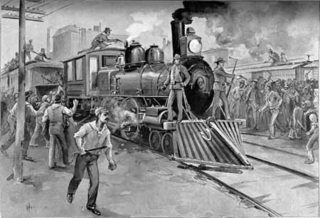 Pullman was a manufacturer of luxury rail coaches, and as such, found itself hit especially hard by the depression that followed the Panic of 1893. To compensate for its losses, the company decided to slash worker’s pay by one-third, but not to reduce the amount they were paying for rent – leaving little option for the retention of human dignity but to strike. Urged by the charismatic Eugene V. Debs, who had helped to organize the American Railway Union, the strike quickly became an object of concern to Illinois and federal officials, with Pullman cars being overturned in their yards by angry workers and rail traffic between Chicago and the Pacific coast soon paralyzed.
Pullman was a manufacturer of luxury rail coaches, and as such, found itself hit especially hard by the depression that followed the Panic of 1893. To compensate for its losses, the company decided to slash worker’s pay by one-third, but not to reduce the amount they were paying for rent – leaving little option for the retention of human dignity but to strike. Urged by the charismatic Eugene V. Debs, who had helped to organize the American Railway Union, the strike quickly became an object of concern to Illinois and federal officials, with Pullman cars being overturned in their yards by angry workers and rail traffic between Chicago and the Pacific coast soon paralyzed.
The Governor at the time, John Peter Altgeld, was a German immigrant and a friend of the little guy – the year before, he’d pardoned those convicted of violence in the Haymarket bombings of 1886 (or at least, the ones who hadn’t already been executed). Unfortunately, Attorney General Richard Olney was cut from a more Gonzalesian cloth: he cooked up a legal basis for federal intervention by suddenly getting real worried about the mail getting through. Cleveland declared with all the pompousness of a concern troll, “If it takes the entire army and navy to deliver a postal card in Chicago, that card will be delivered,” and in went 2500 soldiers, with bayonets fixed.
The strike was crushed in under a week, and with it, much of the progressive dream for securing equitable treatment from the federal government. Debs was arrested and imprisoned (where he did a lot of the reading that turned him into a diehard Socialist); the AG had, Cheney-like, discerned a heretofore unknown federal power over the states; the Sherman Antitrust Act had been transformed into an evil mirror twin of its original intent, as it was now a weapon to be used against unions; and labor dealt itself a punishing blow when the AF of L – concerned for its reputation as a “respectable” player in the whole debate – refused to support their brothers dying in rail yards, and allowed Cleveland and the industrial barons a barely-contested victory.
Historiorant:
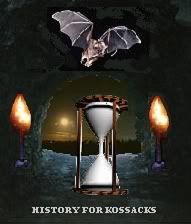
Folks were angrier, less naïve, and more certain than ever that the upcoming presidential election was epochal – but 1896, the Cross of Gold, and the Mark Hanna-inspired anointment of William McKinley will have to wait for another diary in this Land of Enchantment-inspired series. Tune in next week – same bat-time, same bat-channels – for all the impassioned, failed efforts, quixotic charges, and Pink Floyd soundtracked YouTube creations you can shake a silver bug at.
Historically hip entrances to the Cave of the Moonbat can be found at Daily Kos, Progressive Historians, Bits of News, and Never In Our Names

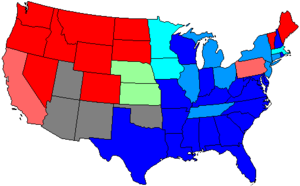
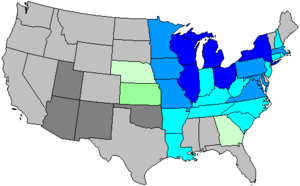
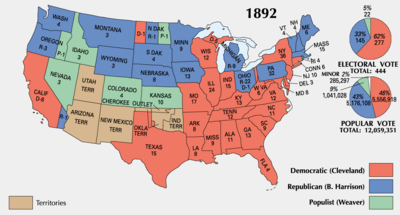
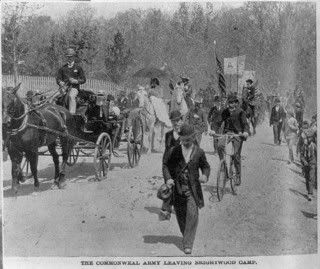
32 comments
Skip to comment form
Author
Thanks for inviting me aboard – I’ll be in touch soon with a new, shorter history format that might be fun!
when there’s a good time.
Bravo, my dear bat, and welcome to the funhouse.
I always have to print your essays to read and digest off line to get the best effect.
I have a question for you. I found out recently that a great aunt of mine ran for congress for the State of Minnesota in 1924 for the Farm-Labor ticket. Apparently this third party won more elections than any other in US history.
Have you come across anything about the Farm Labor Party in your studies, and if so, could you recommend any good references? Thanks muchly.
Something wonnerful to read just before I crash after a three day blogging binge!
Thanks, you sweet adorable bat!
Our story, and our mandate. Thank you so much for telling it so compellingly.
thanks for posting this here.
area, and you would think that the “Homestead Strike” would have been an important subject in our middle or high school history lessons. Unfortunately, it wasn’t. Of course, we did learn something about Frick and Carnegie, especially given the number of Carnegie Libraries that inhabit the Pittsburgh area. When I was a young child, my parents would take us to “Frick Park” for outings. Little did I know…
I was an adult and well out of school by the time I learned what had happened in the area that I had traveled through so frequently, and once I had this knowledge, going through there has never been the same.
Now, all of the steel mill complex is gone; there is a very large “modern-type” strip mall complete with movie theaters, a Dave & Busters, and a near-by water park. It sounds nice, but ask my parents – they absolutely hate going down there, but have to occasionally for medical appointments.
If memory serves me, Carnegie was out of the country when the strike happened. (I want to say he was in France.) Talk about convenient.
Thanks for your essay this evening. I thoroughly enjoyed reading it!
I so love history…
But here, you might need to refer to LoE rather than Land of Enchantment. Been enjoying reading these.
But that’s nothing new: I got on board way back in the Persia series. All in all, your stories are a welcome, if intermittent contribution to my understanding of the world.
Three cheers to the Moonbat!
from when I was about 3 years old. My dad was trying to teach me how to pee into the toilet and after raising the lid, he’d always say “Fire when ready, Gridley!”
He was very clever about changing my diapers too and taught me to hold his nose while he did it.
Great history lesson as usual, Moonbat!
wow . . . very engaging writing.
Now it’s up to us folks to keep that feeding bowl filled.
history essays or diaries and this one was a dilly. We get so little of the story from labor’s side in our official US history. Nice to know where we progressives came from and how our time is not so unique. makes me hopeful. We keep forgetting the vigilance needed to keep progress moving. The other sides, dirty tricks are just the same old, tarted up technologically and called new things. Looking forward to the next, easier to find you here then at Dkos so I won’t miss you in the deluge yet!